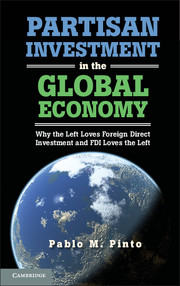 Partisan Investment in the Global Economy
Partisan Investment in the Global Economy Book contents
- Frontmatter
- Contents
- List of Figures
- List of Tables
- Acknowledgments
- 1 Domestic Coalitions and the Political Economy of Foreign Direct Investment
- 2 A Political Economy Model of Foreign Direct Investment
- 3 Tying Hands or Exchanging Hostages: Partisan Governments, Commitment, and FDI Performance
- 4 Partisan Governments and Foreign Direct Investment: Results from Cross-Country Statistical Analyses
- 5 Labor and Business Influence, Investment Regimes, and Foreign Investment in Argentina
- 6 Business Influence, Politics, and Foreign Direct Investment in South Korea
- 7 Conclusion
- Bibliography
- Index
3 - Tying Hands or Exchanging Hostages: Partisan Governments, Commitment, and FDI Performance
Published online by Cambridge University Press: 05 March 2013
- Frontmatter
- Contents
- List of Figures
- List of Tables
- Acknowledgments
- 1 Domestic Coalitions and the Political Economy of Foreign Direct Investment
- 2 A Political Economy Model of Foreign Direct Investment
- 3 Tying Hands or Exchanging Hostages: Partisan Governments, Commitment, and FDI Performance
- 4 Partisan Governments and Foreign Direct Investment: Results from Cross-Country Statistical Analyses
- 5 Labor and Business Influence, Investment Regimes, and Foreign Investment in Argentina
- 6 Business Influence, Politics, and Foreign Direct Investment in South Korea
- 7 Conclusion
- Bibliography
- Index
Summary
Introduction
As discussed in previous chapters, foreign direct investment (FDI) has become an important source of revenue and foreign exchange for governments, employment opportunities for workers, and access to technology and markets for host country firms (Graham, 1996; Moran, 1999; Lipsey, 2001, 2004; Carcovic and Levine, 2005; Brown et al., 2004). Moreover, the free flow of investment capital leads to allocative efficiencies that foster growth and aggregate welfare gains for sending and receiving countries, and across the global economy. Despite the potential aggregate gains from crossborder flows of investment capital, Multinational corporations (MNCs) are often highly controversial and are the source of heated political debates. The end result is that significant variation exists in the regulatory environment offered to foreign investors across countries and over time. What explains, variation in policy toward FDI? The theory introduced in this book suggests that changes in the political influence of workers and businesses could help explain this puzzle.
Cross-country comparisons show that governments have chosen very different policies toward foreign investors. Japan and South Korea, for example, both of which are associated with pro-business governments and business-friendly economic policies, have been highly restrictive toward foreign investors, whereas Singapore, The Netherlands, and Belgium have set up foreign investor-friendly regulatory environments. In the liberalizing 1990s, numerous countries abandoned import substitution and command economic policies.
- Type
- Chapter
- Information
- Partisan Investment in the Global EconomyWhy the Left Loves Foreign Direct Investment and FDI Loves the Left, pp. 71 - 96Publisher: Cambridge University PressPrint publication year: 2013


